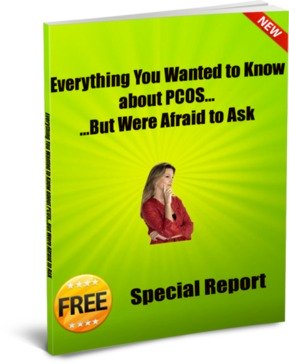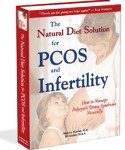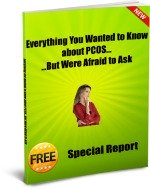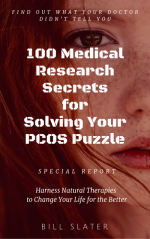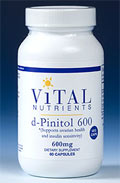PCOS Review Newsletter #159
2) What Do P C O S and Alzheimer's Disease Have in Common?
3) Is Your Glass Half Empty or Half Full?
2) What Do PCOS and Alzheimer's Disease Have in Common?
I'll bet the last thing you're thinking about is Alzheimer's Disease (also called "AD". After all, that's something for old people to worry about, not you.
I've been mostly silent on this issue since 2008, when I wrote a couple of newsletter articles about it. I always feel a little uncomfortable when I go far out on a limb. But I'm going to speak out anyway. In doing my research for the upcoming hair loss prevention e-book, I've come across some evidence I hadn't seen before:
- There is a higher risk of sporadic AD in people with Type 2 diabetes, and AD patients are more prone to Type 2 diabetes.
- Being obese or overweight in midlife is a possible risk factor of AD in later life.
- People with AD exhibit impaired glucose metabolism, abnormally high insulin levels and insulin resistance. (So do the majority of women with PCOS.)
OK, given there might be a future risk for you, what can you do to reduce it?
One thing you can do is review your diet. Are you being careful about the amount and types of fat you're consuming? In studies of mice, it appears that a high-fat diet induces insulin resistance, which in turn encourages the creation of a protein thought to be a probably cause of Alzheimer's.
Kings College in the UK has reported that 68% of women with PCOS consume a diet that is more than 35% fat calories. Roughly 1/3 of those fat calories come from saturated fat. Based on this research, it looks like there is some room for modifying your consumption of fats.
If you have a copy of the PCOS diet ebook, review the section on Fats & Oils. Supplemental fish oil is also highly advisable. And take a good, hard look at the amount of saturated fats you're consuming.
Second, eat at least five servings of vegetables every day. You're probably tired of hearing me say it. I only say it because there is convincing medical evidence showing that you can minimize ALL of your future risks if you do this.
And third, do anything you can to consistently exercise and be physically active. Imagine what it would be like if you were a physically fit person. Exercise is almost miraculous in terms of how it helps your body, your self-esteem, and ward off future degenerative diseases.
It's all basic stuff just good health practices. It's well proven that good health practices are the best health insurance you could possibly have.
Sources:
Ho L et al, Diet-induced insulin resistance promotes amyloidosis in a transgenic mouse model of Alzheimer's disease. FASEB J. 2004 May;18(7):902-4. Epub 2004 Mar 19.
Meakin PJ et al, Reduction in BACE1 decreases body weight, protects against diet-induced obesity and enhances insulin sensitivity in mice. Biochem J. 2012 Jan 1;441(1):285-96.
Barr S et al, Habitual dietary intake, eating pattern and physical activity of women with polycystic ovary syndrome. Eur J Clin Nutr. 2011 Oct;65(10):1126-32.
3) Is Your Glass Half Empty or Half Full?
This is a profound question if you take time to think about it.
If you view your life as a glass half empty, you may be dooming yourself to an unfulfilled, unhappy life. You could become a pessimist who sees nothing but problems.
On the other hand, if you see your life as a glass half full, your attention is focused on the aspects of your life that are working for you. You have an optimistic point of view.
The amount of water in the glass is the same. It's all in how you look at it either half empty or half full. An optimist sees a situation as an opportunity whereas a pessimist sees a situation as a problem.
If your life is at all like mine, you are presented with challenges and unexpected events every single day. Some are significant, some aren't. It's vital that we be resourceful in how we respond, and not blindly react or get caught in a downward emotional spiral. Here are a few ideas.
a) Escape the "It's Not Fair" trap.
Sometimes we get locked into a perspective of "it's not fair". It's not fair that some people are billionaires while others can't put food on their table. It's unfair that my friend has an incurable brain tumor. Or that a father of four was innocently driving his family down a street in my town and was killed by a resident who was shooting at his neighbor across the street. It's unfair that you have PCOS.
To get lost in feelings of unfairness is unhelpful. It's more resourceful to accept the reality of the situation and determine your next step to improve it or change your attitude about it.
b) Stop comparing yourself to others.
There's an old saying in Alcoholics Anonymous: "Don't compare your inner with another person's outer." Do you ever look at other people and say to yourself, "Wow, they are really happy and have a life that is so much better than mine". Well, we all do that.
But the fact is, all those apparently happy and fulfilled and beautiful people also have their inner challenges and problems to deal with.
It's fruitless to think that somehow you're inferior to another person. You actually have very little idea whether the other person is happier than you or not. Focus on your own strengths, abilities and good fortune. Forget about the other person.
c) Focus on your "sphere of influence".
Do you spend much time absorbing the news of the day? Have you noticed that 90% of it is negative information? Do you really need all this negativity?
Politicians continue to act stupidly and selfishly. Hurricanes, tornadoes and tsunamis wipe out entire towns. People are starving in Africa. There is unrest in the Middle East. Europe is on the brink of a financial disaster. Millions are unemployed. And on and on.
These events may affect you in some way but as a practical matter, you have no influence whatever on the course of these mostly negative events.
A more effective alternative is to focus all of your time and attention on those matters over which you have some influence, such as yourself, your family and friends, your job, your home, and your community.
Try this: Don't check the news at all for 2 weeks. Don't read the newspaper. Don't watch TV. Don't check your smart phone for the latest news. Take the time you save and invest it in improving personal relationships, your job, your home and garden, your family, your health, and how you feel about yourself.
At the end of 2 weeks, ask yourself: "Did avoiding the news make a difference in my life?"
"Let the world know you as you are, not as you think you should be, because sooner or later, if you are posing, you will forget the pose, and then where are you?" -- Fanny Brice
PCOS Health Review
This free newsletter gives you original and immediately usable information to help you deal with PCOS.
Get the latest research, tips for improving your health, answers to questions, success stories, and more!
Your e-mail address is totally secure. We will never misuse your information.
Enter Your Email Above to Subscribe Today
and Get Your Questions Answered in this Free Special Report!
